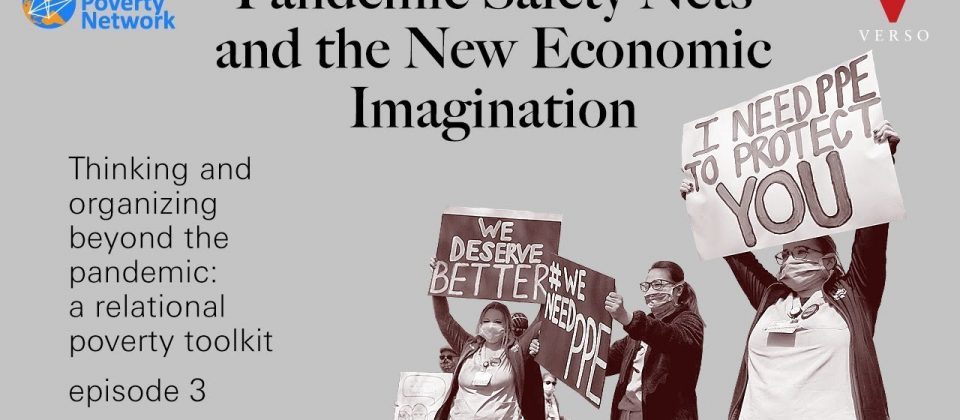Description
A virtual teach-in with speakers from the United States and Australia on social welfare and social control.
This is the third instalment in a four-part teach-in series, co-sponsored by Verso Books and the Relational Poverty Network, entitled Thinking and organising beyond the pandemic, a relational poverty toolkit.
All of our events are freely available, but please make a solidarity donation if you’re able to help us keep putting on these free events.
————-
As the coronavirus cascades through the social and species bonds that encompass our humanity, it taxes the dominant frameworks by which we understand and organize wealth, resources, labor, and entitlement. Everywhere we hear human health and “the economy” framed as if they were competing realms of society, while that economy is simultaneously revealed to be (as every six-year-old knows) a negotiable social construct. New economic metaphors like “hibernation” and “snap back” are invented overnight to describe it, while the necessity of safety nets and demand-side economics are rediscovered (after being dismantled through decades of neoliberal reform), the wheel of social welfare hastily reinvented, and even sacrosanct principles like debt and rent become malleable. Panelists from Australia and the United States will ask: What forms of economic common sense are now viable, or superseded? What new kinds of support and safety nets are being invented? What vectors of citizenship, inclusion, or control are constructed within the new economic imagination?
Speakers:
Sanford F. Schram is a Professor of Political Science at Hunter College and Professor of Sociology at the Graduate Center, City University of New York. He is the author of books such as The Return of Ordinary Capitalism: Neoliberalism, Precarity, Occupy.
Kaaryn Gustafson is the Director of the Center on Law, Equality and Race at the University of California, Irvine. Her research explores the role of law in remedying and in reinforcing inequality, the administrative overlap between the welfare and criminal justice systems, and the history of law in regulating African American families and labor among poor people of various ethnic backgrounds. She is the author of Cheating Welfare: Public Assistance and the Criminalization of Poverty.
Eve Vincent, a senior lecturer in the Dept of Anthropology at Macquarie University in Sydney. Her research explores conditional welfare measures targeting Indigenous Australians and single mothers.
Thomas Gokey is an organizer with the Debt Collective, a membership organization working to transform individual financial struggles into a source of collective power. They have erased millions in medical and student debt, empower people to dispute debts, and conduct direct actions and non-cooperation campaigns, working toward broad debt cancellation while fighting for policies to end mass indebtedness.
Lizzie O’Shea is a lawyer, writer, broadcaster, and founder of Digital Rights Watch. Her commentary is featured regularly on national television programs and radio, about law, digital technology, corporate responsibility, and human rights. Her writing has appeared in the New York Times, Guardian, and Sydney Morning Herald, among others. Her book, Future Histories (Verso, 2019), looks at radical social movements and theories from history and applies them to debates we have about digital technology today.
The Relational Poverty Network convenes an international community of scholars, teachers, policy makers, and activists working within and beyond academia to develop conceptual frameworks, research methodologies, and pedagogies that shift from thinking about “the poor and poor others” to relationships of power and privilege. They work across boundaries to foster a transnational, comparative and interdisciplinary approach to poverty research that involves multidirectional theory building and incorporates marginalized voices to build innovative concepts for poverty research.


Leave a Reply